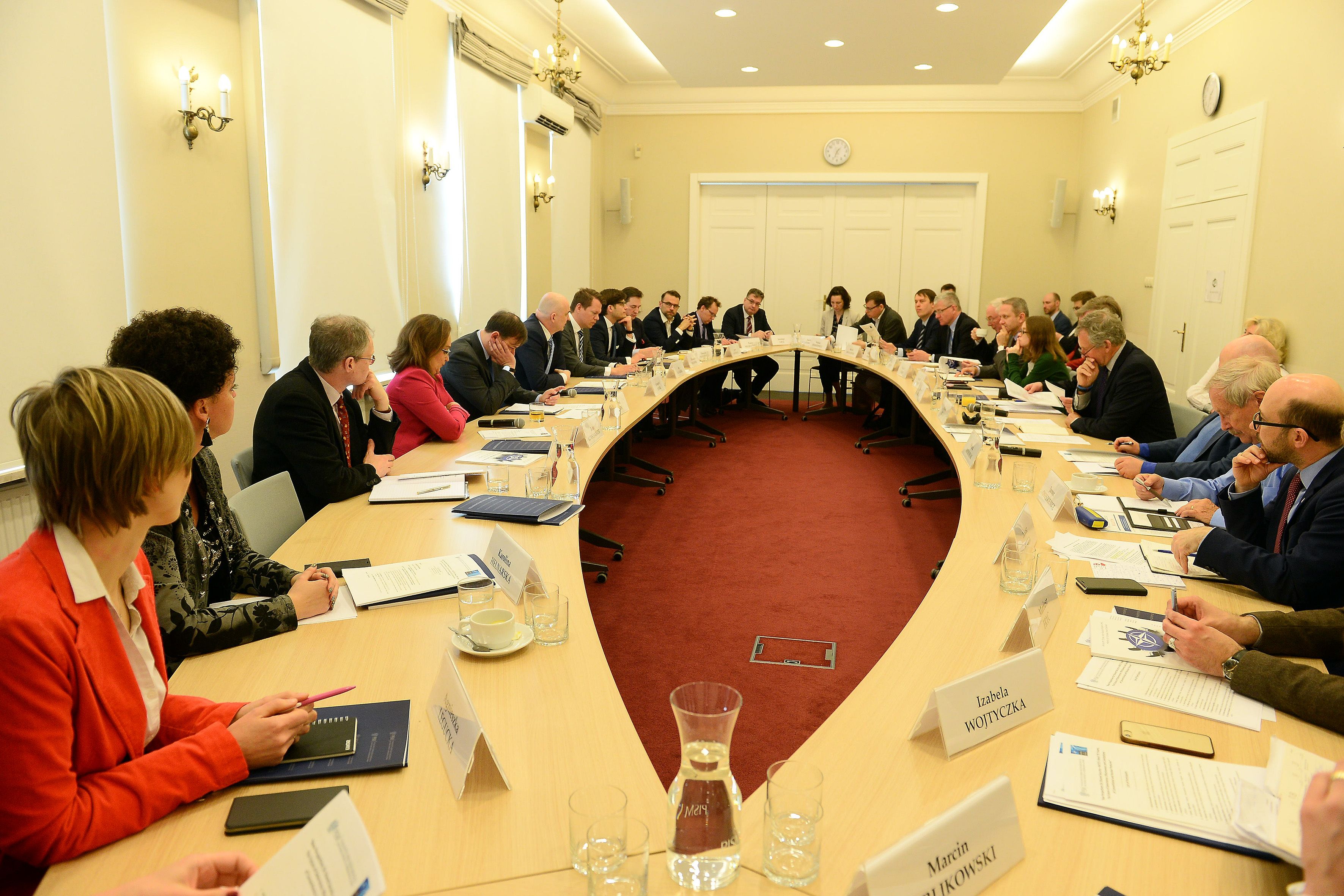25.04.2019, 17:30
 ©PISM
©PISM
Agenda:
24 April 2019 (Wednesday)
12:30–13:30 Welcome Lunch
13:30–13:45 Opening and Welcome Remarks Sławomir Dębski, Director, the Polish Institute of International Affairs
13:45–15:00 Session I. Upholding the 360-degree Principle: Challenges and Opportunities for Keeping NATO Relevant to All Its Members
What will be the biggest future challenges for NATO in carrying out simultaneously its three core tasks: collective defense, crisis management and cooperative security? How should NATO develop a future-oriented capacity to deal with both: politico-military threats posed by state actors and asymmetric/non-military challenges? Which socio-economic and technological changes will have decisive impact on transatlantic security? How can NATO contribute to security in the world of rising rivalries between global powers and the demise of international regimes?
Jan Havranek, Policy Advisor, Policy Planning Unit, IS, NATO Marek Madej, Deputy Director, Institute of International Affairs, Warsaw University Moderator: Beata Górka-Winter, Associate Professor, Warsaw University
15:00–15:15 Coffee Break
15:15–16:45 Session II. Utility and limitations of deterrence against state actors
How credible is NATO deterrence internally (reassurance) and to its potential opponents, most notably Russia? What are the strong and weak spots in NATO deterrence construct? Should we focus more on “software” (including political cohesion, signalling) or ‘hardware’ (capabilities and posture)? In which direction should NATO’s deterrence posture evolve in light of nonconventional/hybrid tactics of actors like Russia? Is it feasible for NATO to deter actions beyond the military dimension, including non-military, economic, cyber activities?
Marek Menkiszak, Head of the Russian Department, Centre for Eastern Studies Heinrich Brauss, Senior Associate Fellow, German Council on Foreign Relations Moderator: Andrew Budd, Head Capabilities Section, Defense Policy Directorate, International Staff, NATO
25 April 2019 (Thursday)
9:00–09:30 Welcome Coffee
9:30–10:45 Session III. Which Way Towards a Reinforced NATO’s Conventional Deterrence?
Where has Russia’s doctrine and conventional modernisation program been heading to and what are the consequences for upholding NATO’s deterrence? What are currently the biggest challenges to the enhancement of NATO’s reinforcement capacity in areas such as readiness, military mobility, or command and control? In the short to mid-term, should NATO revisit the balance between reinforcements and forward presence? How significant is the time-distance gap for the credibility of deterrence? Would NATO’s conventional deterrence capabilities be needed beyond the Eastern Flank?
Tony Lawrence, Research Fellow, International Centre for Defense and Security, ICDS Tallinn Justyna Gotkowska, Project Coordinator, Security and Defense in Northern Europe Program, Centre for Eastern Studies
Moderator: Dominik Jankowski, Political Advisor, Head of the Political Section, Polish Representation to NATO
10:45–11:00 Coffee Break
11:00–12:15 Session IV. The Future Integrated NATO’s Deterrence Posture: Reaching the Conventional-Nuclear Coherence
Has the Alliance done enough to adapt and improve its nuclear posture after 2014? What challenges remain? Are current nuclear modernisation programs in the Alliance sufficient or might NATO need additional capabilities to counter new systems, like 9M729? Should NATO utilize nuclear weapons more for deterrence signalling? What does coherence of deterrence mean in practice? How closely should the nuclear part be integrated with other elements of NATO’s deterrence posture?
Anna M. Dyner, the Polish Institute of International Affairs Paul Schulte, Honorary Professor, Institute for Conflict, Cooperation, and Security, University of Birmingham Dave Johnson, Defense Policy Section, Defense Policy and Planning Division, International Staff, NATO Moderator: Łukasz Kulesa, the Polish Institute of International Affairs
12:15–13:00 Concluding session – where do we go from here?
Does NATO need a new Deterrence and Defense Posture Review? What should be NATO’s priorities in capability development in the next 10 years to strengthen deterrence? Can political developments or technological progress change decisively the existing deterrence concepts?
Input: Fabrice Pothier, Chief Strategy Officer at Rasmussen Global; Senior Defense Fellow IISS Moderator: Marcin Terlikowski, the Polish Institute of International Affairs
13:00–14:00 Farewell Lunch
16:00 – 17:30 Public Debate: The Future of NATO : Finishing the “Unfinished Business” of Making Europe Whole, Free and at Peace


